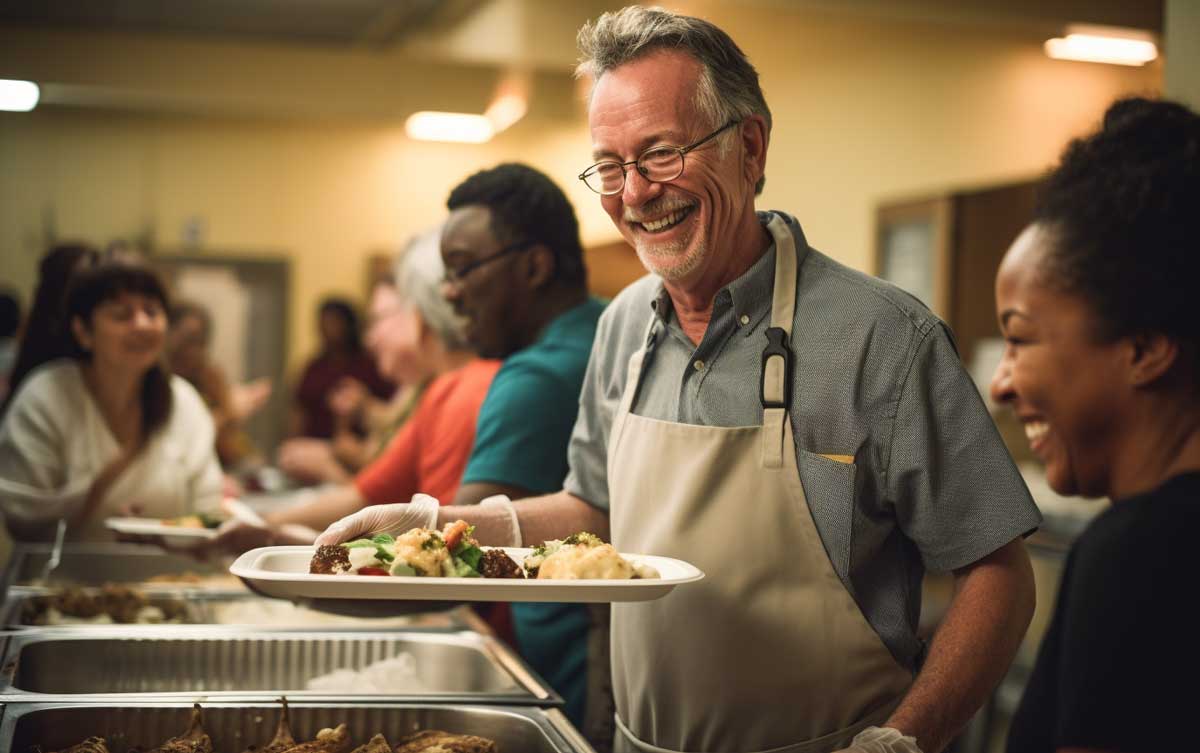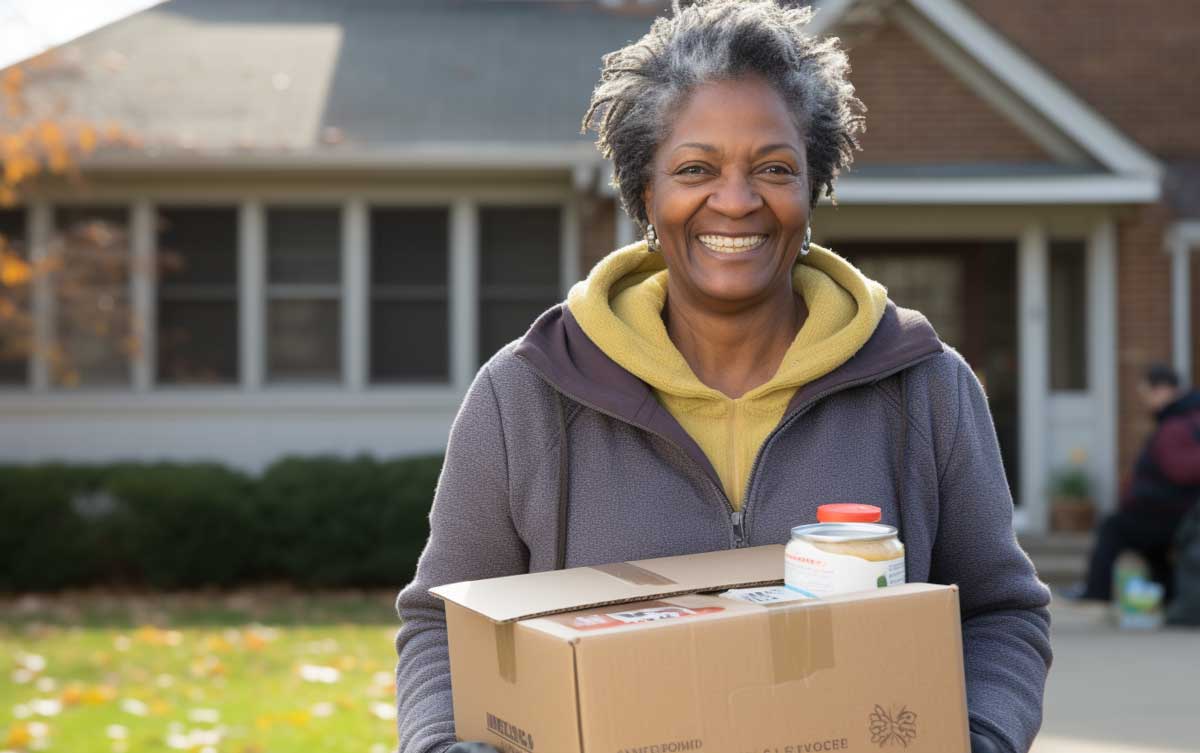Nutritious meals, a basic human right, remain elusive for many homeless individuals. Nationwide, various organizations, including the Salvation Army, offer free, balanced meals, especially during challenging summer months.
It's more than just sustenance; it's about promoting health amid food insecurity. Many initiatives also grant financial aid, education, and social services. To find free meals near you, search local community meals, food pantries, and online databases like Feeding America. Through these groups, the homeless find food and the means to stability.
Overview of the Problem of Homelessness
Homelessness remains a significant concern in the US, with over half a million people experiencing it on any night, according to the Department of Housing and Urban Development.
Among the myriad challenges they face, access to nutritious food ranks high. A report by the U.S. Conference of Mayors found that in major cities, 25% of those requesting emergency food aid were homeless. To address this pressing need, numerous organizations, from the Salvation Army to local food banks, have initiated free meal programs nationwide.
These entities don’t merely provide sustenance. Their focus is on offering balanced, nutritious meals to combat the health ramifications of prolonged food insecurity. As these programs continue to expand, their efforts fill a crucial gap, ensuring that thousands facing homelessness have not only a meal but a chance for improved health and a stepping stone toward stability.
-
Causes of Homelessness: A complex interplay of economic, social, and personal factors, homelessness arises from multifaceted challenges affecting individuals and communities alike.
-
Poverty: A primary driver, poverty traps individuals in a cycle where even basic needs become unattainable, heightening vulnerability to homelessness.
-
Lack of Affordable Housing: With housing costs soaring, many find adequate shelter out of reach, pushing them into precarious living situations or onto the streets.
-
Mental Illness and Substance Abuse: Untreated mental health issues and addiction can erode personal and financial stability, often leading to homelessness without proper support.
-
Domestic Violence and Trauma: Victims often flee abusive situations without resources, and the trauma endured can exacerbate their descent into homelessness.
-
Physical Disability or Illness: Medical conditions can strain finances and hinder job opportunities, making stable housing elusive for many afflicted individuals.
Free Meal Programs for the Homeless Near Me
Food insecurity plagues many homeless individuals in our community, compromising their health. Thankfully, free meal programs, including those by the Salvation Army, offer solace. Committed to addressing hunger, they deliver daily meals, ensuring none face starvation.
Multiple community entities, food pantries, and banks supplement these efforts, providing well-rounded nourishment. Operating year-round, they understand hunger's ceaseless nature. Beyond food, many programs offer educational opportunities, financial assistance, and social services, tackling homelessness's root causes.
To locate such services, contact community hubs, churches, or national networks like Feeding America. With homelessness presenting myriad challenges, no one should suffer hunger. By championing these initiatives, we edge closer to a community where empathy reigns supreme.
Salvation Army Meal Programs
Addressing hunger among the homeless, the Salvation Army emerges as an emblem of hope. Committed to service, they ensure none in our community starve, extending daily meal programs that go beyond nourishment—they foster connection and access to resources.
Prioritizing nutrition, the Salvation Army guarantees balanced meals, operating year-round, as hunger respects no calendar. Yet, their impact transcends food; they address homelessness holistically. Alongside meals, they provide educational opportunities, financial aid, and other social services.
To access these programs, contact your local Salvation Army or consult their website. Partnering with networks like Feeding America, they magnify their reach. In essence, the Salvation Army offers more than meals; they're a foundation for stability and resurgence. For those seeking sustenance or aid, their doors are perpetually open, underscoring community solidarity.
Fresh Produce and Nutritious Food Providers
Addressing hunger among the homeless demands more than just filling empty stomachs—it requires nutritious sustenance. Key players like Feeding America, a nationwide food bank network, champion this cause, ensuring the homeless access healthy food options, from fresh fruits to lean proteins.
Local community gardens amplify this mission, not only supplying food but teaching the homeless about nutrition and sustainability. By participating, they gain skills enhancing their long-term food security. Other pantries emphasize health in their meal offerings, knowing the holistic benefits of nourishment.
The backbone of such initiatives? Generous donations from the public and businesses. In essence, to truly combat hunger and elevate the well-being of the homeless, supporting organizations offering fresh, nutritious food is paramount. Through collective efforts, a healthier future for homeless individuals becomes an attainable vision.
Soup Kitchens and Community Meal Services
Soup kitchens and community meal services are pillars in the fight against hunger for the homeless and food-insecure. Spearheaded by entities like the Salvation Army and the Community Kitchen by 4allpeople.org, these programs deliver more than hot meals. They offer supportive services, access to resources, and a sense of community.
The Salvation Army, omnipresent in many cities, pairs their meals with social work services. Meanwhile, the Community Kitchen in San Antonio targets the vulnerable evening hours, serving balanced meals.
Beyond sustenance, these establishments ensure meals are served with dignity in a welcoming setting, combating social isolation for many. While some also offer skill-building workshops, all rely on the generosity of volunteers and donors. By championing such programs, communities actively combat hunger, fostering unity and compassion for all.
Food Pantries and Food Banks
Food pantries and food banks are pivotal in combatting hunger and food insecurity. Localized food pantries, operating from churches and community centers, distribute food directly to those in need, relying on community donations.
In contrast, food banks function as vast warehouses, sourcing donations from manufacturers, wholesalers, and local farmers. They supply essential items to various charitable organizations, including food pantries. Aiming to offer well-balanced food selections, from staple grains to fresh produce, they prioritize overall nutrition.
Beyond immediate relief, many proactively empower communities by introducing nutrition education and budget-friendly cooking classes. Accessing these services usually involves direct contact, local directories, or referrals from community stakeholders. In addressing hunger and fostering healthier lifestyles, food pantries, and banks serve as vital community lifelines, ensuring nourishment during financial strains or crises.
Additional Benefits Offered by Free Meal Programs for the Homeless Near Me
Free meal programs for the homeless extend beyond mere sustenance, actively elevating the quality of life for their beneficiaries. They offer a remedy against the pervasive loneliness many homeless individuals encounter, fostering essential social connections in communal settings.
Serving as vital hubs, these programs introduce individuals to a spectrum of critical resources, from healthcare and employment assistance to shelter options. Moreover, these initiatives often distribute indispensable items such as clothing, blankets, and hygiene products, directly impacting daily lives.
Some even facilitate educational sessions, focusing on life skills and job readiness, equipping participants to surmount homelessness. Offering a judgment-free zone, they and prioritize safety and inclusivity. In essence, these programs address multifaceted needs, acting as community pillars, empowering individuals, and championing resilience in the face of adversity.
FAQs
1. What kind of meals do these free programs typically offer?
These programs usually provide balanced, nutritious meals, considering dietary requirements and cultural preferences wherever possible.
2. How are these programs funded?
They largely rely on donations, community support, partnerships with local organizations, and sometimes governmental assistance.
3. Can anyone volunteer or donate to these meal programs?
Yes, most programs welcome volunteers and appreciate donations, whether it's time, money, or essential items.
4. Are there eligibility criteria for individuals to access these meals?
While primarily catered to the homeless, many programs aim to assist all in need, with minimal to no barriers to access.
5. How often do these programs serve meals?
Frequency varies—some serve daily, others weekly, or during specific days.
Conclusion
Free meal programs for the homeless play an irreplaceable role, addressing not just hunger but broader societal needs. Beyond nourishment, they are vital community pillars, fostering inclusivity, empowerment, and collective resilience, proving that holistic care goes far beyond a plate of food.
Learn how to find EBT restaurants near your location from our blogs at Gov Relation.







